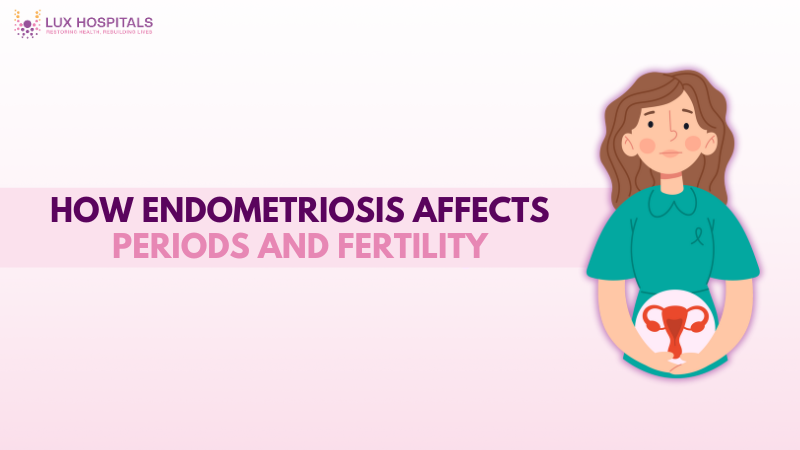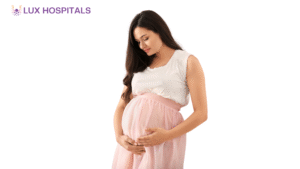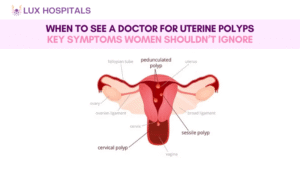How Endometriosis Affects Periods and Fertility

Endometriosis is a chronic illness that affects millions of women worldwide, typically leading to painful periods, heavy bleeding, and challenges with fertility. It occurs when, outside the uterus, tissue resembling the lining of the uterus develops, leading to scarring and inflammation. formation. Understanding how endometriosis affects menstrual cycles and fertility is necessary for prompt diagnosis, appropriate care, and improving overall quality of life.
What Is Endometriosis?
When endometrial-like tissue develops on organs like the ovaries, fallopian tubes, and pelvic lining outside of the uterus, it is known as endometriosis. During the menstrual cycle, these tissues react to hormonal fluctuations, resulting in inflammation and excruciating pain. This eventually results in adhesions, or scar tissue, which can affect fertility and deform reproductive tissues.
How Endometriosis Affects Periods
1. Painful Periods (Dysmenorrhea)
Endometriosis patients frequently have severe menstrual pains that are unabated by standard painkillers. This pain can start days before the menstrual cycle and last the entire time, making it difficult to go about regular tasks. Additionally, emotional stress and a lower quality of life can be caused by chronic pain.
2. Heavy Menstrual Bleeding
Because endometriosis causes tissue growth outside the uterus and hormonal imbalances, it can result in severe or extended monthly bleeding. Additionally, some women may bleed in between periods, which can result in iron deficiency and exhaustion. Many times, these symptoms are disregarded, which delays an accurate diagnosis and course of therapy.
3. Irregular Cycles
Endometrial lesions that disrupt the normal hormonal cycle might cause irregular periods. Before or after their period, women may have spotting or uneven cycle durations. Physicians can detect endometriosis early by monitoring these changes.
How Endometriosis Affects Fertility
1. Scar Tissue and Adhesions
When endometriosis causes inflammation, the body responds by forming scar tissue, which can stick organs together. This can block the fallopian tubes or alter the structure of the pelvis, which makes it more difficult for the egg to pass through to the uterus. In severe cases, this significantly reduces the chances of natural conception.
2. Hormonal Disruption
Endometriosis may interfere with normal hormone production, affecting ovulation and egg quality. This can lead to irregular or absent ovulation, which decreases fertility potential. Balancing hormones is often a key focus in treating endometriosis-related infertility.
3. Inflammation of the Reproductive Organs
Chronic inflammation caused by endometriosis can damage eggs, sperm, and embryos. Additionally, it might make the uterus hostile, which would make it difficult for embryos to implant. Medical treatments that lower inflammation can improve reproductive outcomes.
Diagnosis and Treatment Options
Diagnosis
A combination of pelvic exams, ultrasound tests, and occasionally surgery for direct visualization is used to diagnose endometriosis. An early diagnosis can help avoid problems and preserve fertility.
Treatment
Treatment depends on the severity of symptoms and fertility goals:
- NSAIDs and hormonal treatments, such as birth control pills, can help manage pain.
- Hormone therapy: Suppresses endometrial growth and reduces pain.
- Surgery: Laparoscopic surgery removes endometrial lesions and scar tissue to improve fertility chances.
- Fertility treatments: IVF and other assisted reproductive technologies may be recommended for women struggling to conceive.
Living with Endometriosis
A combination of pelvic exams, ultrasound tests, and occasionally surgery for direct visualization is used to diagnose endometriosis. An early diagnosis can help avoid problems and provide emotional support. Regular exercise, stress management techniques, and support groups can help improve overall well-being. Partnering with a skilled gynecologist is crucial for long-term management.
Conclusion
Endometriosis is a complex condition that not only affects menstrual health but also impacts fertility. Understanding its symptoms, causes, and treatment options can help women make informed decisions about their reproductive health. Early diagnosis and a comprehensive treatment plan can improve both quality of life and fertility outcomes.
Frequently Asked Questions
No, endometriosis does not usually stop periods, but it can make them more painful and irregular. Some women may experience lighter or heavier bleeding depending on the severity of the condition. Hormonal treatments can sometimes affect menstrual flow.
Endometriosis causes hormone imbalances, inflammation, and scar tissue, all of which have an impact on fertility. Ovulation, egg quality, and implantation are all hampered by these alterations. For many women to conceive successfully, fertility treatments are necessary.
Yes, if treatment is not received, endometriosis can worsen, resulting in higher discomfort, heavier bleeding, and more problems with conception. The progression of disease can be slowed with routine medical examinations and treatment. Better management depends on early diagnosis. disease progression. Early diagnosis is key to better management.
Yes, a large number of endometriosis patients can conceive either naturally or with medical assistance. IVF and surgery are two treatments that can greatly increase the likelihood. Early consultation with a fertility professional can improve the chances of success.
Early warning signs include severe menstrual cramps, pain during intercourse, heavy bleeding, and ongoing pelvic pain. Bloating, exhaustion, and digestive issues can also appear. Prompt therapy is made possible by the early recognition of these symptoms






















